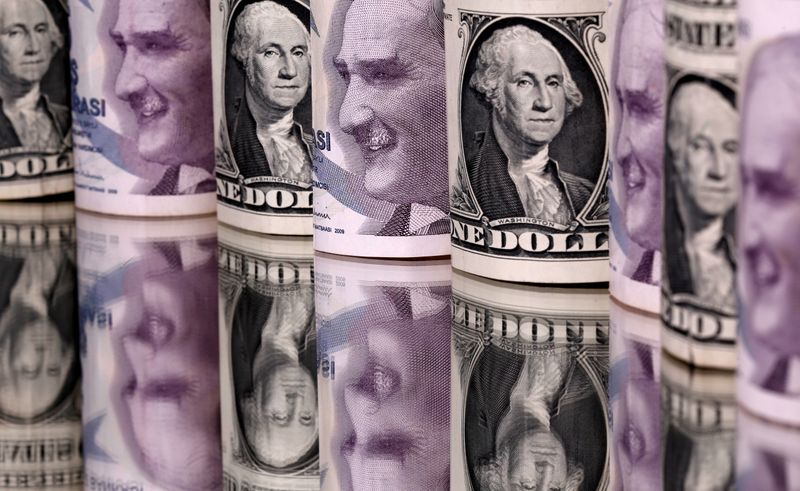(Bloomberg) --
The Turkish lira may be on course for its worst month since August 2018, fueling speculation that the central bank will once again turn to an outsized interest-rate hike to stem the rout.
Since the start of October, the currency has lost around 7% of its value against the dollar, a depreciation reminiscent of the meltdown two years ago that forced the central bank to jack up borrowing costs by 625 basis points.
Like then, the trigger is a cocktail of mounting geopolitical risks and concern that monetary policy remains far too loose to anchor the currency. Investors say if the losses aren’t contained, the central bank may ultimately have to take action before its next scheduled meeting on Nov. 19.
It wouldn’t be the first time. The central bank raised interest rates by 300 basis points in an emergency meeting in May 2018 to curb the lira’s losses, and more than doubled them in an unscheduled meeting in January 2014.
“There is no reason why the lira could not overshoot to a level such as 9.00 per dollar in coming weeks,” said Tatha Ghose, a senior economist at Commerzbank (DE:CBKG) AG (OTC:CRZBY) in London, adding that a large emergency rate hike might be the only policy response that could break the momentum.
The currency weakened as much as 1.6% to 8.3224 against the dollar Wednesday, extending by far the biggest decline in emerging markets this month. It was down 0.4% to 8.3016 per dollar as of 11:02 a.m. in Istanbul, set for a sixth day of declines.
The losses come after the central bank stunned investors by holding the one-week repo rate steady last week while increasing the late liquidity window, a marginal source of lending originally intended for emergency funding.
That marked a policy u-turn that quashed hopes the monetary authority was determined to tighten policy and curb inflation. In September, the central bank began reversing an easing cycle by unexpectedly raising interest rates by 200 basis points to 10.25%.
On Edge
For a market already on edge given diplomatic tussles over energy exploration in the Mediterranean, and a deepening rift between Ankara and its Western allies, last week’s decision was a decisive stroke. Further darkening the outlook, the central bank on Wednesday raised its inflation projections for the end of this year to 12.1%, from a previous forecast of 8.9%.
Amid the tumult, the central bank appeared to be leaving open the possibility for action.
“In the period ahead, we can take all the necessary steps, including on policy interest rates,” Governor Murat Uysal said in the central bank’s quarterly inflation briefing on Wednesday, noting that the lira was “extremely undervalued.”
While Uysal said the central bank wasn’t targeting an exchange rate, he warned that a weak lira poses risks to price stability and said the policy maker will maintain its tight monetary policy until inflation improves.
Yet that didn’t compel traders to scale back their bearish bets on the currency. One-month risk reversals -- a closely watched gauge of investor positioning and sentiment -- jumped to the highest level since early September after the comments.
“We think an emergency rate hike could come at any time as this sort of move in the lira is unsustainable,” Win Thin, the New York-based global head of currency strategy at Brown Brothers Harriman & Co, wrote in a note.
No Panacea
But even a rate hike is no guarantee that the currency will recover lost ground.
While the lira rallied in the months that followed the surprise increases in September 2018, it still ended the year down almost 30%, the second-biggest loss in the developing world. Following an emergency increase in 2014, the currency ended the year 8% lower.
At the the heart of the issue is that investors remain uneasy about President Recep Tayyip Erdogan’s sway over monetary policy. He places a premium on growth and job creation and holds the unconventional view that lower rates cause lower inflation.
For its part, the central bank over the years has resorted to what the market calls stealth tightening -- raising borrowing costs and tweaking liquidity, but keeping headline rates steady. Last week, the central bank widened its so-called interest-rate corridor to give itself more flexibility in increasing the weighted-average cost of funding.
“The current interest rate regime aims to tighten in a temporary and oh very unconvincing way,” said Timothy Ash, a strategist at BlueBay Asset Management. “The reality is people simply do not believe the CBRT’s prime focus is inflation; they think it is delivering growth, jobs and poll support for the ruling party.”
(Updates lira prices in sixth paragraph.)
©2020 Bloomberg L.P.
